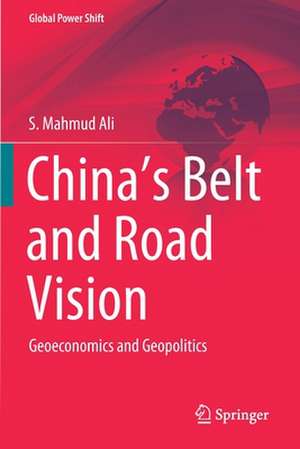China’s Belt and Road Vision: Geoeconomics and Geopolitics: Global Power Shift
Autor S. Mahmud Alien Limba Engleză Paperback – 24 ian 2021
Offering two case studies on the China-Pakistan Economic Corridor (CPEC) and the 21st Century Maritime Silk Road (MSR), the book reveals the drivers motivating China and its partners in executing BRI projects, such as security of commodity-shipments, energy supplies, and explores trade volumes as well as the anxiety these trigger among critics. The book juxtaposes these to non-Chinese, specifically multilateral institutional and Western corporate, inputs into Beijing’sdevelopmental planning-processes. It also identifies the role of combined Chinese-foreign stimuli in generating the policy priorities precipitating the BRI vision, and the geoeconomic essence of BRI’s implementation.
| Toate formatele și edițiile | Preț | Express |
|---|---|---|
| Paperback (1) | 699.59 lei 6-8 săpt. | |
| Springer International Publishing – 24 ian 2021 | 699.59 lei 6-8 săpt. | |
| Hardback (1) | 705.83 lei 6-8 săpt. | |
| Springer International Publishing – 24 ian 2020 | 705.83 lei 6-8 săpt. |
Din seria Global Power Shift
-
 Preț: 357.43 lei
Preț: 357.43 lei - 15%
 Preț: 642.51 lei
Preț: 642.51 lei - 20%
 Preț: 557.45 lei
Preț: 557.45 lei - 20%
 Preț: 569.00 lei
Preț: 569.00 lei - 15%
 Preț: 650.69 lei
Preț: 650.69 lei - 15%
 Preț: 640.71 lei
Preț: 640.71 lei - 18%
 Preț: 1005.11 lei
Preț: 1005.11 lei - 18%
 Preț: 1114.96 lei
Preț: 1114.96 lei - 15%
 Preț: 645.60 lei
Preț: 645.60 lei - 15%
 Preț: 705.34 lei
Preț: 705.34 lei - 18%
 Preț: 1126.35 lei
Preț: 1126.35 lei - 18%
 Preț: 2088.15 lei
Preț: 2088.15 lei - 15%
 Preț: 702.54 lei
Preț: 702.54 lei - 15%
 Preț: 646.11 lei
Preț: 646.11 lei - 15%
 Preț: 698.47 lei
Preț: 698.47 lei - 18%
 Preț: 896.21 lei
Preț: 896.21 lei - 15%
 Preț: 698.62 lei
Preț: 698.62 lei - 18%
 Preț: 779.89 lei
Preț: 779.89 lei - 15%
 Preț: 691.76 lei
Preț: 691.76 lei - 15%
 Preț: 692.24 lei
Preț: 692.24 lei - 18%
 Preț: 721.51 lei
Preț: 721.51 lei - 18%
 Preț: 729.84 lei
Preț: 729.84 lei -
 Preț: 381.98 lei
Preț: 381.98 lei - 18%
 Preț: 779.39 lei
Preț: 779.39 lei - 18%
 Preț: 783.98 lei
Preț: 783.98 lei - 18%
 Preț: 733.46 lei
Preț: 733.46 lei - 9%
 Preț: 789.75 lei
Preț: 789.75 lei
Preț: 699.59 lei
Preț vechi: 823.05 lei
-15% Nou
Puncte Express: 1049
Preț estimativ în valută:
133.90€ • 139.26$ • 112.21£
133.90€ • 139.26$ • 112.21£
Carte tipărită la comandă
Livrare economică 13-27 martie
Preluare comenzi: 021 569.72.76
Specificații
ISBN-13: 9783030362461
ISBN-10: 3030362469
Ilustrații: XX, 330 p.
Dimensiuni: 155 x 235 mm
Greutate: 0.49 kg
Ediția:1st ed. 2020
Editura: Springer International Publishing
Colecția Springer
Seria Global Power Shift
Locul publicării:Cham, Switzerland
ISBN-10: 3030362469
Ilustrații: XX, 330 p.
Dimensiuni: 155 x 235 mm
Greutate: 0.49 kg
Ediția:1st ed. 2020
Editura: Springer International Publishing
Colecția Springer
Seria Global Power Shift
Locul publicării:Cham, Switzerland
Cuprins
1. Introduction.- 2. Fear Factor - Strategists vs. Bankers.- 3. Belt-and-Road: An Evolving Network.- 4. East Meets West: Belt and Road Initiative’s Eclectic Origins.- 5. Case Study 1: The China-Pakistan Economic Corridor.- 6. Case Study 2: The 21st Century Maritime Silk Road.- 7. Conclusion: Geoeconomics or Geopolitics?.
Notă biografică
S. Mahmud Ali studied at the Pakistan Military Academy, Royal United Services Institute for Defence Studies (RUSI) and King’s College London. After working for the British Broadcasting Corporation (BBC) as a broadcast journalist, analyst and editor for two decades he was appointed as East Asia International Affairs Programme Associate at the LSE IDEAS. Currently a Research Associate at the Institute of China Studies in Kuala Lumpur, he has authored nine books including a six-volume series on US-Chinese strategic insecurity dynamics from 1942 to 2016.
Textul de pe ultima copertă
This book examines the evolution and major elements of China’s Belt-and-Road Initiative (BRI), a trillion-dollar project for the revival and refinement of ancient terrestrial and maritime trade routes. The author analyses the foreign policy and economic strategy behind the initiative as well as the geoeconomic and geopolitical impact on the region. Furthermore, he assesses whether the BRI has to be considered as a challenge to the US-led order, leading to a Sinocentric order in the 21st century.
Offering two case studies on the China-Pakistan Economic Corridor (CPEC) and the 21st Century Maritime Silk Road (MSR), the book reveals the drivers motivating China and its partners in executing BRI projects, such as security of commodity-shipments, energy supplies, and explores trade volumes as well as the anxiety these trigger among critics. The book juxtaposes these to non-Chinese, specifically multilateral institutional and Western corporate, inputs intoBeijing’s developmental planning-processes. It also identifies the role of combined Chinese-foreign stimuli in generating the policy priorities precipitating the BRI vision, and the geoeconomic essence of BRI’s implementation.
Caracteristici
Examines the evolution and major elements of China’s Belt-and-Road Initiative (BRI) Analyses the foreign policy and economic strategy behind the initiative as well as the geoeconomic and geopolitical impact on the region Offers two case studies on the China-Pakistan Economic Corridor (CPEC) and the 21st Century Maritime Silk Road (MSR)
